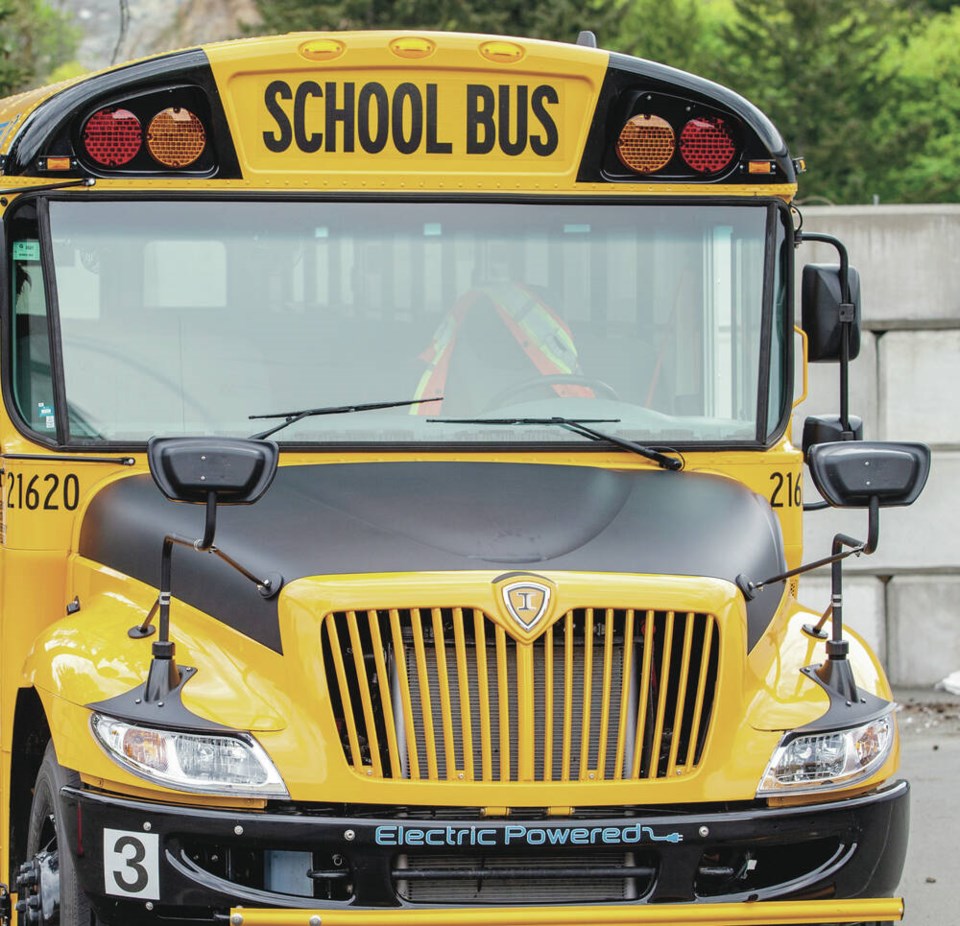As B.C. parents sent their kids back to school last month, the enduring impacts of climate change were not far from mind.
This summer was no exception to extreme heat. Wildfires again destroyed homes and led to evacuation orders in the Fraser Valley and the Okanagan, when communities are still recovering from last summer’s catastrophic fire season.
Parents are rightly concerned about the future of their kids, about climate change, and air pollution.
But there are solutions at B.C.’s fingertips, the most visible one, to parents, could be electric school buses. Some districts in B.C. are already running electric school buses — and for the parents of kids on those routes, the sight of the bus pulling up will be an important reminder that B.C. is closing the gap between current emissions and its 2030 target.
But B.C. needs to do more and act faster to meet the urgency of the moment.
In the race to tackle climate change, electric school buses offer a quick win for governments to act on. Electrifying school bus fleets brings climate, health and economic benefits.
Of all the medium and heavy-duty vehicles (MHDVs) in B.C., school buses are some of the easiest vehicles to electrify. Most route lengths are within the range of current battery capacities, and predictable travel patterns allow for charging at night, at off-peak times. As well, bi-directional charging potentially allows for bus batteries to be used as storage or in the event of an emergency power outage.
Electric school buses also have excellent GHG-reduction potential. Research commissioned by the Pembina Institute shows that the electrification of all buses owned by B.C. school districts could eliminate 428 thousand tonnes of CO2e over the approximately 12-year lifetime of the buses.
While their initial cost is higher than diesel buses, electric school buses are operationally cost-competitive in the immediate term and outperform diesel buses in the long-term. Over 12 years, electrification can save school districts over $250 million in operational costs while also allowing them to generate up to $132 million in offsetting revenue from the sale of electric vehicle charging credits under B.C.’s Low-Carbon Fuel Standard.
In addition to eliminating GHGs, electrification eliminates the harmful air pollution that children and bus drivers currently breathe in every day on the way to and from school.
It is well known that diesel engine exhaust is linked to numerous short- and long-term health impacts, including asthma, lung cancer, and cardiovascular impacts. Studies have shown that pollutant levels can be elevated on diesel school buses and in school yards.
Based on the elimination of these harmful health hazards, school bus electrification could save the province approximately $15 million in health-care costs.
The last benefit of ESBs is that they’re a tangible educational opportunity for kids, parents and local community members — they demonstrate that low-carbon technologies work and that B.C. is taking action on climate change.
For these reasons and more, the cost of electric school buses is well worth the investment by B.C. However, the province has not been automatically investing in ESBs.
Despite the temporary electrification subsidies that have been filling the funding gap since 2020, B.C. has not made a concerted effort to normalize electrification in its bus replacement program or set clear procurement targets that would create accountability.
It is time for the province to set a clear plan for the electrification of public fleets and to fund the Ministry of Education’s “bus acquisition program” to meet the cost of electric school buses. The release of B.C.’s Transportation Action Plan in 2023 would be a great opportunity to introduce a strategic roadmap for electric school bus deployment.
The province should also introduce new procurement targets so that by 2025, a minimum of 50% of all new buses purchased by B.C. school districts are zero emission. To accomplish this, the budget would need to allocate about $21 million to the ministry of education in 2025.
Children in B.C. deserve to ride to school on buses that are good for their health and good for their future.
B.C. has committed to reducing emissions from the transportation sector and there is no place more worthwhile of decisive action than the buses that drive the province’s next generation to school every day.
>>> To comment on this article, write a letter to the editor: [email protected]



